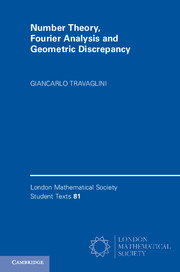1 - Prelude
Published online by Cambridge University Press: 05 July 2014
Summary
Number theory deals with the properties of the positive integers, which were probably the first mathematical objects discovered by human beings. In this chapter we shall initially study the factorization of positive integers into primes, a basic result called the fundamental theorem of arithmetic. The possibly exaggerated title ‘Prelude’ refers to the second section, where we introduce Chebyshev's theorem on the distribution of prime numbers. This result is remarkable and yet rather easy to understand, and it may encourage the reader to approach more advanced topics in number theory.
For the first part of this book we have used various references, including [3, 4, 6, 8, 9, 42, 46, 63, 68, 72, 76, 90, 93, 96, 101, 103, 108, 119, 120, 127, 128, 136, 145, 151, 165].
Prime numbers and factorization
We shall denote by ℕ = {1, 2, …} the set of natural numbers and by ℤ the set of integers. We shall say that 0 ≠ b ∈ ℤ divides a ∈ ℤ if there exists c ∈ ℤ such that a = bc. In this case we shall write b | a. If b does not divide a we shall write b ∤ a.
We know that, given a ∈ ℤ and b ∈ ℕ, there exist (unique) q, r ∈ ℤ such that a = bq + r, with 0 ≤ r < b. We present the following consequence.
Information
- Type
- Chapter
- Information
- Publisher: Cambridge University PressPrint publication year: 2014
